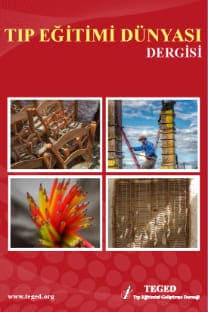Anatomi̇de Tahni̇t ve Di̇seksi̇yon Eği̇ti̇mi̇ İçi̇n Olası Bi̇r Kaynak: Sağlık Turizmi*
Sağlık turizmi, Tahnit, Anatomi eğitimi
A Potential Source In Embalming And Dissection Education: Health Tourism*
Health tourism, Embalming, Anatomy education,
___
- Akpolat Y. Ölüm Sosyolojisi’ne Dair: Ölüm İdeolojisi Ya Da Ölümün Toplumsallaştırılması Olarak Eshab-ı Kehf Miti 2013; 51: 121-134.
- Ögcem E. İnsan-Doğa İlişkisinde Ahlaki Bir Neden Olarak Tanrı Faktörü. İnsan ve Toplum Bilimleri Araştırmaları Dergisi 2016; 5(8): 2950-2962.
- Kurt E, Yurdakul SE, Ataç A. An overwiew of the Technologies used for anatomy education in terms of medical history. Procedia – Socialand Behavioral Sciences 2013; 103: 109 – 115.
- Lanska D. The evolution of Vesalius's perspective on Galen's anatomy. History of Medicine 2015; 2(1): 13-26.
- Vanneste, S.F. The Black Death And The Future Of Medicine. 2010. Wayne State University Theses. Paper 29.
- Olry R. Body Snatchers: the Hidden Side of the History of Anatomy. J Int Soc Plastination 1999; Vol 14(2): 6-9.
- Türkiye'de kadavra sorunu ve çözüm önerileri, Türk Anatomi ve Klinik Anatomi Derneği Yönetim Kurulu, 2013.
- ISSN: 1303-328X
- Yayın Aralığı: 3
- Başlangıç: 2000
- Yayıncı: Tıp Eğitimini Geliştirme Derneği
Tıpta Uzmanlık Eğitimi ve Asistan Hekimlerin Sorunlarının İrdelenmesi: Bir Anket Çalışması
Yasin YILMAZ, Ebubekir UÇAR, Hakan ERTİN
Patoloji Eğitiminde Harmanlanmış Öğrenme Yaklaşımının Akademik Başarı ve Memnuniyet Üzerine Etkisi
Arif ONAN, Alp USUBÜTÜN, Barış SEZER
Anatomi̇de Tahni̇t Ve Di̇seksi̇yon Eği̇ti̇mi̇ İçi̇n Olası Bi̇r Kaynak: Sağlık Turizmi
Epistemolojik İnanç Ölçeğinin Tıp Eğitimi Alanı İçin Geçerlik ve Güvenirlik Çalışması
Şeyda Ferah ARSLAN, Özlem SARIKAYA
Ulusal Çeki̇rdek Eği̇ti̇m Programı Ai̇le Heki̇mli̇ği̇ Prati̇ği̇ndeki̇ Sorunları Kapsıyor mu?
Aysel BAŞER, Giray KOLCU, Hatice ŞAHİN
Anatomi̇de Tahni̇t ve Di̇seksi̇yon Eği̇ti̇mi̇ İçi̇n Olası Bi̇r Kaynak: Sağlık Turizmi*
İzmir Kâtip Çelebi Üniversitesi Tıp Fakültesi Organizasyon Şeması ve Optimizasyonu
Akıllı telefon kullanımının karanlık tarafı (Nomofobi): Endişelenmemize gerek var mı?
Barış SEZER, Bürge ATILGAN ÇİFTÇİ
Uzun Vaka Olarak Sinema Filmlerinin Kullanımına Bir Örnek: The Doctor
Müesser ÖZCAN, Edip Güvenç ÇEKİÇ, Ümmühani ÖZEL TÜRKCÜ, Hülya ELBE
